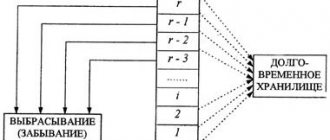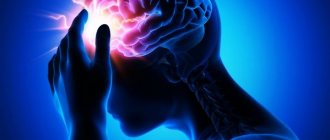Memory disorders are one of the complex neuropsychiatric disorders that complicate life. In older people, memory loss is a natural process of aging. Some disorders can be corrected, while others are a symptom of a more severe underlying condition.
Memory impairment in psychology
Mental memory disorders are a group of qualitative and quantitative disorders in which a person either stops remembering, recognizing and reproducing information, or there is a noticeable decrease in these functions. In order to understand how certain disorders affect a person’s memory of information, it is important to understand what memory is. So, memory is the highest mental function, which includes a complex of cognitive abilities: memorization, storage, reproduction.
The most common memory disorders are:
- hypomnesia
– decrease or weakening; - paramnesia
– errors in memory; - amnesia
– loss of events (before or after).
Memory impairment in children with visual impairment:
A person receives more than 80% of information through vision. Therefore, visual impairment leads to a significant deterioration in memory processes and perception of the environment, especially in childhood.
Such children are characterized by a decrease in the volume and speed of memorization, faster forgetting of learned material due to the lower emotional significance of non-visual images. The average number of repetitions of information required for effective memorization is almost twice that of a sighted child.
In the process of adaptation to visual impairments, the verbal-logical component of memorization is enhanced, and the volume of short-term auditory memory increases. At the same time, motor memory deteriorates.
Causes of memory disorders
Why are memory disorders observed? There are many reasons for this, both psychological and pathological, as well as traumatic effects on a person. Memory impairment – psychological causes:
- psycho-emotional stress;
- depression;
- overwork due to mental or heavy physical work;
- a psychotrauma that once occurred, causing a defensive reaction - repression;
Disorders of memory functions – organic causes:
- asthenic syndrome;
- long-term toxic effects on the brain of alcohol and drugs;
- unfavorable environment;
- various circulatory disorders (stroke, atherosclerosis, hypertension);
- brain oncology;
- viral infections;
- Alzheimer's disease;
- congenital mental illnesses and genetic mutations.
External influences:
- traumatic brain injuries;
- difficult birth with forceps applied to the baby's head.
Treatment of memory impairment in children:
In choosing tactics for treating memory disorders in children, identifying the cause of such problems plays a primary role. After all, memory loss is always a secondary consequence of the development of many somatic or mental diseases and conditions. Therefore, without adequate treatment of primary diseases, it is impossible to achieve any lasting results in the correction of memory impairment.
Treatment of such patients should always be selected individually, taking into account the type and nature of the disorders, aimed at correcting diseases that have led to memory impairment, and designed for long-term therapy.
In any case, self-medication is unacceptable, since at the initial stage many serious diseases (including those accompanied by memory impairment) have fairly harmless symptoms. Only an experienced specialist in child psychology can recognize such diseases and prescribe effective therapy. Therefore, early contact with a clinical psychologist contributes to the effective correction of memory impairment and prevents the development of deep advanced stages of dementia.
In addition to specific treatment of the pathology that led to memory impairment, general psychological correction measures aimed at normalizing memory functions are mandatory and parallel.
Types of memory impairment
Many people are familiar with the concept of amnesia, because the word itself very often appears in various films or TV series, where one of the characters loses his memory or pretends not to remember anything, and meanwhile, amnesia is just one type of memory impairment. All types of memory disorders are usually divided into two large groups:
- Quantitative
– hypermnesia, amnesia, hypomnesia. - Qualitative
– confabulation, contamination, cryptomnesia, pseudoreminiscence.
Cognitive memory disorder
Memory refers to the cognitive functions of the human brain. Any memory disorders will be cognitive and leave an imprint on all human thought processes. Cognitive memory disorders are usually divided into 3 types:
- lungs
– amenable to drug correction; - moderate
– occur earlier than in old age, but are not critical, often associated with other diseases; - severe
- these disorders occur with general damage to the brain, for example as a result of progressive dementia.
Quantitative memory disorders
Memory impairment - dysmnesia (quantitative disorders) is divided by psychiatrists into several types. The largest group consists of various types of amnesia, in which memory loss occurs for a certain period of time. Types of amnesia:
- retrograde
– occurs on events preceding a traumatic, painful situation (for example, the period before the onset of an epileptic seizure); - anterograde
(temporal) – a loss of events occurs after the traumatic situation has occurred; the patient does not remember the period when he got to the hospital; - fixation
- a memory disorder in which current impressions are not remembered; a person at this moment can be completely disoriented in space and after a few seconds all actions in the current moment are forgotten by the patient forever; - congrade – loss of state memory during delirium, oneiroid, amnesia in this case can be total or fragmentary;
- episodic - it also happens to healthy people when they are tired, for example, drivers who have been on the road for a long time; when remembering, they can vividly remember the beginning and end of the journey, forgetting what happened in the intervals;
- children's
– inability to remember events that occurred before 3–4 years of age (normal); - intoxication
– with alcohol and drug intoxication; - hysterical
(catatymic) – turning off traumatic events from memory; - affective
– loss of events occurring during affect.
Quantitative memory disorders include the following disorders:
- hypomnesia
(“perforated memory”) – the patient remembers only important events; in healthy people this can be expressed in weak memory for dates, names, terms; - hypermnesia
is an increased ability to remember past events that are irrelevant at the moment.
Impaired short-term memory
Psychiatry associates short-term memory disorders with many factors and causes, most often with concomitant diseases and stress factors. Short-term or primary, active memory is an important component of memory in general, its volume is 7 ± 2 units, and the retention of incoming information is 20 seconds; if there is no repetition, the trace of information becomes very fragile after 30 seconds. Short-term memory is very vulnerable, and with amnesia, events that happened 15 seconds to 15 minutes ago are lost from memory.
Memory and speech impairment
Auditory-speech memory is based on images imprinted by the auditory analyzer and memorization of various sounds: music, noise, speech of another person, severe memory and speech disorders are characteristic of mentally retarded children and due to damage to the left temporal lobe of the brain due to injury or stroke, which leads to acoustic syndrome - mnestic aphasia. Oral speech is poorly perceived by patients and out of 4 words spoken aloud, only the first and last are reproduced (edge effect).
Thinking and memory disorders
All cognitive functions of the brain are interconnected, and if one function is impaired, over time, others begin to suffer along the chain. Memory and intelligence disorders are observed in Alzheimer's disease and senile dementia. If we consider how a violation occurs, we can cite as an example that a person performs many operations in his mind, which are stored in the form of experience with the help of short-term and long-term memory. With memory impairment, there is a loss of this experience synthesized by memory and thinking.
Memory and attention disorder
All attention and memory disorders negatively affect the memory of events, situations and information. Types of memory and attention disorders:
- functional
– occur when it is impossible to focus attention on a specific action, which is manifested by deterioration of memory, typical for ADHD in children, stress; - organic
- for mental retardation, Down syndrome, and the development of dementia in the elderly.
Memory disorders due to brain damage
When different parts of the brain are affected, memory disorders have different clinical manifestations:
- damage to the hippocampus and the “Peipetz circle” - severe amnesia occurs for current everyday events, disorientation in space and time, patients complain that everything falls out of memory, and they are forced to write everything down in order to remember;
- damage to the medial and basal parts of the frontal lobes - characterized by confabulations and memory errors, patients are not critical of their amnesia;
- local lesions of the convexital sections - a violation of mnestic function in any specific area;
- Memory impairment after a stroke can be verbal (the patient cannot remember the names of objects, names of loved ones), visual - there is no memory of faces and shapes.
Memory impairment in a child
Basically, memory development disorders in children are associated with asthenic syndrome, which together represents high psycho-emotional stress, anxiety and depression. An unfavorable psychological climate, early deprivation, and hypovitaminosis also provoke amnesia in children. Often, children exhibit hypomnesia, expressed in poor assimilation of educational material or other information, while, along with memory impairment, all cognitive functions suffer.
Memory disorder in older people
Senile dementia or senile memory disorder, popularly called senile marasmus, is one of the most common memory disorders in the elderly. Dementia is also accompanied by diseases such as Alzheimer's, Parkinson's and Pick's diseases. In addition to amnesia, there is a extinction of all thought processes, and dementia sets in with personality degradation. Unfavorable factors in the development of dementia are cardiovascular diseases and atherosclerosis.
How to improve a child’s memory: tasks, methods
As for preschool children, it is best to present information to them in a playful way, and also to develop memory with the help of poems, tongue twisters, and interesting rhymes. Start with the simplest and most fun. These could be some kind of ditties, songs, poems. Everything that is learned in kindergarten is done for a reason, but with the goal of developing the child’s memory and stimulating brain function. This is a kind of preparation of the child for school.
Tasks for a child’s poor memory:
- The child may have a really bad grasp of information, but there is no need to be upset. The simplest option is to use a quatrain. Say the quatrain several times, and starting from the third time, ask the child to finish the sentence. Have the child say the last word in the line first, then the last two words in the line, and then three. In this way, the child will be able to fully master the entire poem.
- Oddly enough, but learning dances also contributes to memory development. The simplest option is the dance of little ducklings. What does dance have to do with memory? The fact is that in the case of learning dances, the child’s visual memory improves, and his attention is focused specifically on the movements. Accordingly, the child picks up the oscillatory, translational movements of the arms and legs, and will be able to reproduce them. If your child has trouble remembering poetry, try teaching him to dance. This really helps improve memory.
- Tell stories to your child. Try somewhere in the middle or at the beginning to ask what the kid thinks about the main character, how he imagines him. Such small digressions really help improve memory and memorization. Next time the child will be able to clearly tell you what the fairy tale was about and who the main character is. Tell a fairy tale about the Gray Wolf and Little Red Riding Hood, then ask what color the wolf’s fur was, and what color the main character of the fairy tale’s hat was. Attention to detail also develops a child's memory.
- Try to ask the baby what he did during the day in the garden, what he ate today, and what he remembered. When dressing your child for kindergarten or school in the morning, focus on the color of the underwear or some details that are depicted on the swimming trunks. When your child comes home from school, ask if he remembers what color his swimming trunks are and what is depicted on them. Oddly enough, it really works and helps train your memory. Also, be mindful and pay attention to details during the weekend or when spending time at home. Ask where he left his things, how the wheels are dismantled, and what color the bus was on today. This all helps to concentrate and improve memory.
Activities with the child
No matter how strange these methods may seem, by the beginning of the school year the child will really show good progress in memorization. Children whose parents focused on details and little things really learn to read and write faster and are easy to teach.
Symptoms of memory impairment
The symptoms of disorders are varied and depend on the forms in which memory disorders manifest themselves; in general, the symptoms can be as follows:
- loss of information and skills, both ordinary (brushing teeth) and related to the profession;
- disorientation in time and space;
- persistent gaps for events that occurred “before” and “after”;
- palimpsest – loss of individual events during alcohol intoxication;
- Confabulation is the replacement of memory gaps with fantastic information that the patient believes.
What is hypomnesia: causes, symptoms and treatment of memory failure
Memory problems include a wide group of diseases of various etiologies, but they are not always caused by neurological malfunctions in the body. One of the most common diseases is hypomnesia, which implies memory impairment.
However, at first, the patient does not even notice changes in memory: he is perfectly oriented in familiar terrain, remembers all the famous dates, faces of familiar people, but may forget words (the “blip on the tip of the tongue” phenomenon) or his recent actions (the last few days) .
In addition, in the clinical picture there are often cases where in patients with hypomnesia the so-called auditory memory suffers, while the visual memory remains completely intact. The opposite cases are also less common.
If you notice changes of a similar nature in your life, we advise you to closely monitor their progression. There are high chances that you do not have hypomnesia, but ordinary fatigue or neurosis, and everything will pass soon.
But if, nevertheless, the malfunctions continue, then you need to see a doctor so that a possible disease does not lead to amnesia, that is, to impairment of all types of memory.
Note that hypomnesia, as a disease, is not only partial (when only one type of memory suffers), but also generalized. It can also be temporary, against the background of personality disorders (depression, neurosis), permanent and progressive.
Diagnosis of memory disorders
The main memory impairments should be diagnosed by a doctor so as not to miss a serious concomitant disease (tumors, dementia, diabetes). Standard diagnostics includes a comprehensive examination:
- blood tests (general, biochemistry, hormones);
- magnetic resonance imaging (MRI);
- computed tomography (CT);
- positron emission tomography (PET).
Psychodiagnosis of memory disorders is based on the methods of A.R. Luria:
- Learning 10 words. Diagnostics of mechanical memory. A psychologist or psychiatrist slowly names 10 words in order and asks the patient to repeat in any order. The procedure is repeated 5 times, and when repeated, the doctor notes how many of the 10 words were correctly named. Normally, after the 3rd repetition, all words are remembered. After an hour, the patient is asked to repeat 10 words (normally 8–10 words should be reproduced).
- Associative series “words + pictures”. Impaired logical memory. The therapist names the words and asks the patient to choose a picture for each word, for example: cow - milk, tree - forest. An hour later, the patient is presented with pictures and asked to name the words corresponding to the image. The number of words and complexity-primitiveness in compiling an associative series are assessed.
Daily routine and diet for memory impairment:
It is very important for children with memory impairment to lead an active lifestyle. Walking in the fresh air, hard work, playing sports and other active activities are great for not only strengthening general well-being and improving blood supply to the brain, but also normalizing the child’s overall psychological tone. Such activity is accompanied by the receipt and processing of a significant amount of information, which in turn helps to train memory and attention, and therefore help get rid of this problem.
Moreover, intellectual activity has a very positive impact on a child’s thinking abilities and memory development: reading books, printed and electronic media, and other favorite children’s activities and hobbies. In this case, a variety of brain activities have proven effective. You can always safely find out more about an individual correction program suitable for your child at my psychological consultations after an individual neuropsychological diagnosis of your child.
Maintaining active communication of the patient with relatives and friends, social activity is also very important for strengthening memory and developing its motivational component.
For people suffering from psychogenic memory disorders, a gentle daily routine, avoiding overwork during studies, mental stress and stressful situations in the psychological atmosphere of the family are very important. Also very important is high-quality, full sleep, corresponding to the individual age norm, but not less than 7 – 8 hours a day.
The diet of patients with memory impairment should be balanced, consisting of fish, meat, vegetables, cereals and contain sufficient amounts of proteins, fats, carbohydrates, vitamins and microelements. Since the human brain consumes about 20% of the total energy produced in the body, diets that are extremely low in calories significantly reduce its performance.
Fatty varieties of sea fish are very useful: salmon, herring and others. They contain a lot of iodine and polyunsaturated fatty acids, including omega-3, which are part of the structure of all nerve cells and improve intellectual abilities. Also useful are products made from whole grain cereals (cereals, wholemeal bread), nuts, tomatoes, broccoli, pumpkin seeds.
Drinking regime is very important. You must drink at least two liters of fluid per day. Dehydration has a very detrimental effect on the functioning of the nervous system.
If you notice memory impairment in your children or want to find out more detailed information about the state of memory and undergo neuropsychological testing - Call!
Correction of memory impairments
In many cases, human memory impairments and disorders can be corrected and treated with medication if treated in a timely manner. Methods of correction depend on the type of memory impairment; in case of particularly severe ones, one should not hope for a cure, only for the relief of concomitant symptoms. The main treatment regimen is based on the following therapy:
- relief of an acute condition (for psychosis, trauma);
- vitamin therapy;
- psychotropic drugs (tranquilizers Elenium, diazepam);
- restoration of cerebral circulation (Nootropil, Vinpocetine, Piracetam, Gingko Biloba).
In addition to treatment, the following are prescribed:
- balanced diet;
- herbal medicine (sage, ginger, infusion of motherwort or valerian officinalis);
- Cognitive development of memory helps keep it in good shape until old age (new hobbies, solving crosswords, learning foreign languages).
Treatment methods: drugs, psychological correction and others
The therapy method is selected individually for each patient . All existing pathologies in the body are taken into account.
They primarily influence the cause of memory impairment. For example, the tumor is removed, treatment of hypertension is monitored, and alcohol or drugs are avoided.
Drug therapy is based on taking drugs that improve cerebral circulation (glycine, noofen); statins are prescribed for the treatment of atherosclerotic disease (atorvastatin, rosuvastatin). For hypertension, beta blockers (metoprolol, bisoprolol) are used. Neuroleptics (haloperidol, chlorpromazine) are prescribed to patients with an established psychiatric diagnosis (schizophrenia, delusional disorders).
Psychocorrection is carried out with the aim of restoring or training memory . Such classes are conducted individually using facilitated memorization techniques (Cicero or Aivazovsky method). Rest treatment is effective for physical overload and emotional stress.
Etiology and causes of the disease
The list of reasons that can cause this memory disorder is quite extensive:
- Dementia is a relatively common disease in old age, which leads to memory loss and hypomnesia.
- Atherosclerosis and other cerebral vascular diseases. This also includes the consequences of a stroke.
- Smoking and alcohol can also cause disturbances in memory function, as they interfere with the full conduction of oxygen to the brain, which results in a lack of oxygen and subsequently poisoning.
- Head injuries are one of the main causes of memory loss. As is already reliably known, the temporal cortex of the brain is responsible for storing figurative memory, which means that any damage to it can lead to further disorders and memory failures.
- Brain tumors - in the clinical picture, as a rule, along with memory impairments, other disorders of the body appear.
- Mental disability and mental retardation can also impair normal memory function. For example, lead to hypomnesia.
People with vegetative-vascular dystonia (VSD), epilepsy, hypertensive diseases, drug addiction, somatic diseases, vitamin deficiencies and mental problems are especially at risk of memory disorders.
It is also worth mentioning that the effects of various medications can also lead to memory impairment, so you should carefully study the side effects of the medications you take.










